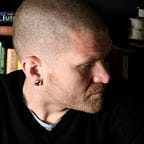The Echo of the Ocean Inside a Shell
Before, years ago.
The echo of the ocean inside a shell, tinny and hollow and deafening, if all you can hear is the echo of the ocean inside a shell.
That echo, what my daughter, Aurora, hears with her left ear.
Her doctor, a well-meaning woman in a white coat (stethoscope around her neck; table computer in her right hand), tried to explain hearing loss in terms I could understand. Mild to moderate, Aurora’s doctor said; more moderate than mild, though.
Aurora’s right ear unaffected; but the left, with its dimpled earlobe and slightly cockeyed cartilage, may need a cochlear implant (worst case), and she would definitely need to learn sign language and how to read lips (best case). Aurora, not yet three months old, failing to stay awake long enough for a portion of the hearing test.
My daughter knew my voice, but I didn’t know her voice, and the doctor explained that her voice and language acquisition may not develop quote-unquote normally. Be prepared, doctor said.
Prepared like a boy scout, vigilance honed since before Aurora was born. Monitoring her heartbeat and watching her hands fingers fingertips develop inside her mother. Her somersaults and sharp edges. Elbow, knee. How her body bent. Echoes of muscle memory, coming into focus.
Children are changelings, features morphing, a balancing act between mother and father. My laugh and nose and chin; her mother’s hair and eyes. Her mother and I, perfect hearing.
All-nighters in front of the computer, learning the difference between the inner and middle ear, and the best way to prevent further degradation. Music, when played, played low. No shouting. No yelling. Talk to her on the right side of her body. Speak at an exaggerated speed. Simple signs.
The sign for more brings together flattened O hands until the fingertips touch. The sign for love blends the hand shapes for the letters I, L, and Y into one hand shape: Thumb, forefinger, pinky extended, the other two fingers bent at the first knuckle until fingers touch palm.
Aurora, not old enough to link word with meaning, but old enough to link word with resulting action. More when she’s hungry and thirsty. Love when she feels safe. Or when she doesn’t want to go to bed. Already willful.
Therapies and monthly visits with early-intervention specialists. Tests, awake and sleep. Somehow, even when Aurora is asleep and connected to a series of electrodes and wires, how well Aurora’s ears hear can be determined. A series of spikes and dips printed and graphed.
The doctor, interpreting.
The echo of the ocean inside a shell.
No additional loss; no improvement.
Cochlear implants, small enough to go unnoticed by kids predisposed to finding differences in classmates. Additional hearing loss, which could happen, might mean a larger implant, with part located above and behind Aurora’s left ear. In plain sight.
Not supposed to worst-case-scenario plan. Advancements in the last dozen years will make Aurora’s life better than it would have been.
Helen Keller worked with less and look what she accomplished.
